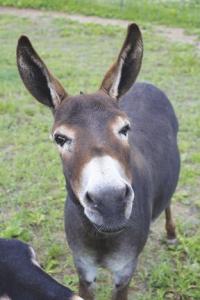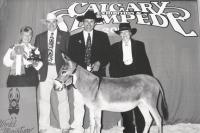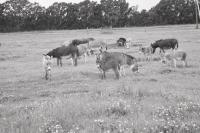
Serving the Vermont Champlain Valley Area for 45 Years
Main SectionsFront Page SportsValley VitalsIt's in the StarsStarwiseArchivesLinksAbout The VoiceContact Us |
Celebrating a Twenty-Three Year Love Affair in Addison - Bring on the MinisTuesday July 14, 2009 By Cookie Steponaitis Twenty-three years ago Michael and Marshlyn Reed went to New Hampshire to buy a miniature donkey. They came home with four and a love affair was born. “They simply stole our hearts,” commented Marshlyn Reed. “We knew within a week that we should have come home with fifty.” While a miniature donkey many not seem to many Vermonters as a desired pet or an agricultural business, the Reed’s are proof to the contrary. Raising Mediterranean Miniature Donkeys on their Ass-Pirin Acres in Addison, the Reeds have turned their passion for the breed into a family business and have earned the respect and accolades of being one of the largest top breeders in the United States. Mediterranean Miniature Donkeys are not native to America and originally come from the islands of Sicily and Sardinia in the Mediterranean Sea. Sturdy and compact beasts of burden, the villagers of the 18th century kept them in their family homes tied to grinding wheels to make flour and carry water and crops from great distance. Originally brought to America in the 1920’s by New Jersey stockbroker Robert Green, the breed has steadily gained recognition and a following that include breeders, owners and collectors of unique animals. Ironically, the animals are almost extinct in their native lands and are being bought back by breeders in America and Europe to repopulate the countries of their origin. The unique combination of size, personality and strength is what attracted Robert Green to the species and has served as the foundation for their growing success world wide. Green remarked in 1929, “Miniature Donkeys possess the affectionate nature of a Newfoundland, the resignation of a cow, the durability of a mule, the courage of a tiger, and the intellectual capability only slightly inferior to man's." Marshlyn was quick to echo these sentiments and added to the accolades commenting that, “Donkeys are the ideal livestock pet. They love you back trifold; are great with children and handicapped individuals and are small enough that children can handle them and learn responsibility. These animals are truly good for the soul and they bring out the best of you.” Now, for you novices who have only seen these animals from a distance as you drove by the huge barn and fields full of 180 donkeys, there are some terms referring to these animals that help all of this become clearer. Mules are not donkeys. In fact a mule has a donkey dad and a mom that was a horse. These are also not to be confused with a hinny, which is an animal that had a mom for a donkey and a dad for a horse. While we are adding to our donkey terminology, a male with breeding capability is called a jack and a female is a jennet or “jenny.” Newborns are called foals and geldings. While the terminology can come quickly the experience in dealing in, raising and training these specialty animals does not. “At first,” commented Marshlyn, “there was not a lot of information available. We were quick to network with people and there was a lot of trial and error at the beginning. Even our vets had to learn the difference in handling these animals. Eventually we grew into the largest miniature donkey farm in New England and down the eastern coast until you get to Alabama. In the 1980’s we were the first breeder to export miniature donkeys to New Zealand and Australia. Today our animals are all over the world and with a heavy concentration in Europe” The Reed’s passion for their work is evident in many ways. Marshlyn shares her skill and commitment as you tour the huge barn complex which the Reed’s added in 2000 after she retired from a career in nursing. She can recall almost 80% of her 180 charges by name and each animal has a microchip embedded in front of the left ear and is linked to a computer data base of all the animals on the farm. Introduced to Antigone, a 21 year old who was part of the original stock of the farm, it is easy to see the connection formed between the animal and owner. Antgione is pregnant and has consistently produced champion offspring over the years. Mediterranean Miniatures are between 30-36 inches at the withers and are bred for color, bloodlines and confirmation. Adults can drive these sturdy animals in a cart and young children can ride them. It is an accepted adage of the Miniature Donkey community that these animals can out pull a horse of the same weight with a load three times as heavy. The geography of their original natural environment in the Mediterranean made them work hard and be appreciated and treasured by their owners. There is an official Mediterranean Miniature Donkey organization and show circuit, but the best of the best are allowed by invitation only to attend the International Select Jennet Sale in Castle Rock, Colorado. The best 36 of the breed from America and Canada will be present for auction. The Reeds were invited and will pack their bags and their animals since three of their donkeys will make up the 36 showcased and sold. Adorning the walls of the office are framed photos of National and World Champion jennets and jacks from Ass-Pirin Acres. Names like Miss Abeline, Jolena, and Angus showcase the recognition and awards that the Reeds have received in the past twenty-three years. While the shows are usually in Texas, California, Tennessee and Oregon, this summer Marshlyn will be hosting her own miniature donkey show at the Addison County Field Days on August 4th. There will be categories for jumps, trail, driving, and costume classes. Besides caring for their 180 animals, both Marshlyn and Michael work on advertising, maintaining the business website and keeping in the loop with the other top American breeders. Exported to Holland, Europe and around the world, Vermont Mediterranean Miniature Donkeys are known to set the standard for excellence in the breed thanks to the devotion and passion of the Reeds. While it is a business, there are also the personal rewards which the Reed’s treasure above all else. “My granddaughter Becca loves the donkeys,” commented Marshlyn. “While I think every child should own a miniature donkey as a pet, it is wonderful for her to see and be a part of these special animals Mediterranean Miniature Donkeys can live into their early forties and it is impossible not to admire the flexibility and tenacity of this transplanted species that is pregnant for 12-13 months and can be found from the American southwest to the mountains of Europe. When asked if it ever got old, Marshlyn smiled and commented, “Never. I can walk out the door and to this barn in the worst mood and within moments I am smiling. They naturally love people and it shows. For us it is a mixture of business, pleasure and a passion for this remarkable breed.” Anyone interested in learning more about this unique part of Vermont’s agricultural landscape can look at the Reed’s website www.asspirinacresdonkeys.com or email them at [email protected]. Marshlyn and Michael ask that if you are interested in a tour or have questions call them for an appointment at (802)759-2665. Located on Route 17 W in Addison, Vermont, the Reed’s are proof of the diversity and depth in the agricultural landscape of Addison County and provide another reason to take the time to travel the back roads, those “less traveled, but the ones that make all the difference.”
|
AdvertisementsSearch our Archives |
Agricultural Weather Forecast:

© 2006-18 The Valley Voice • 656 Exchange St., Middlebury, VT 05753 • 802-388-6366 • 802-388-6368 (fax)
Valleywides: [email protected] • Classifieds: [email protected] • Info: [email protected]



 Printer Friendly
Printer Friendly